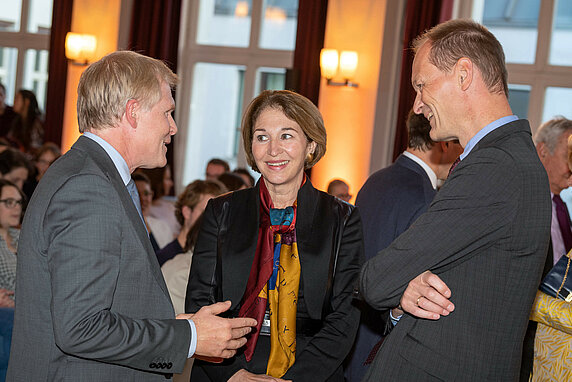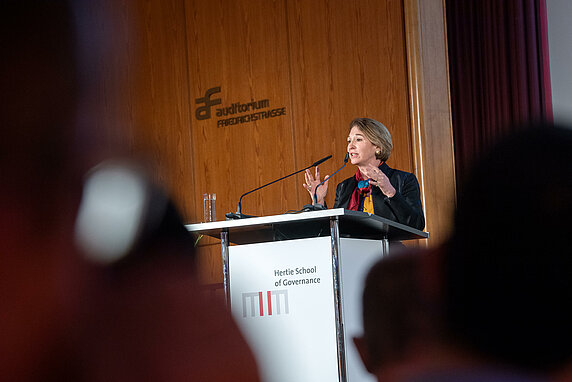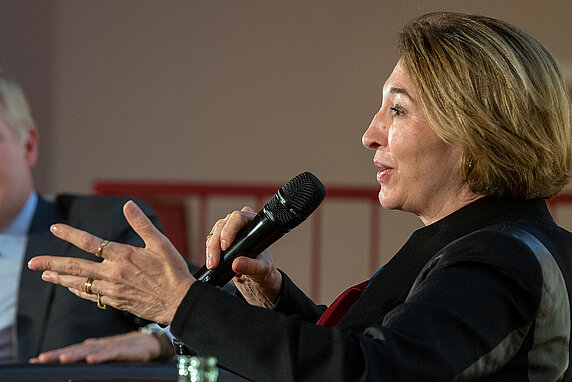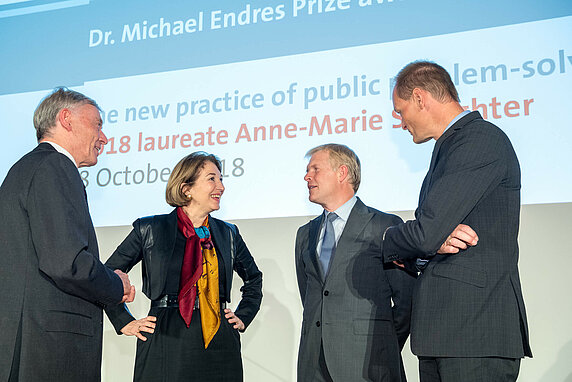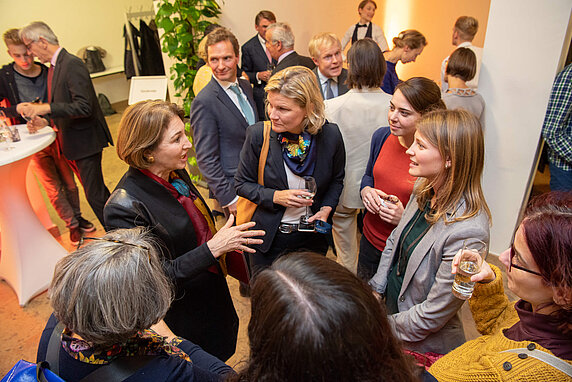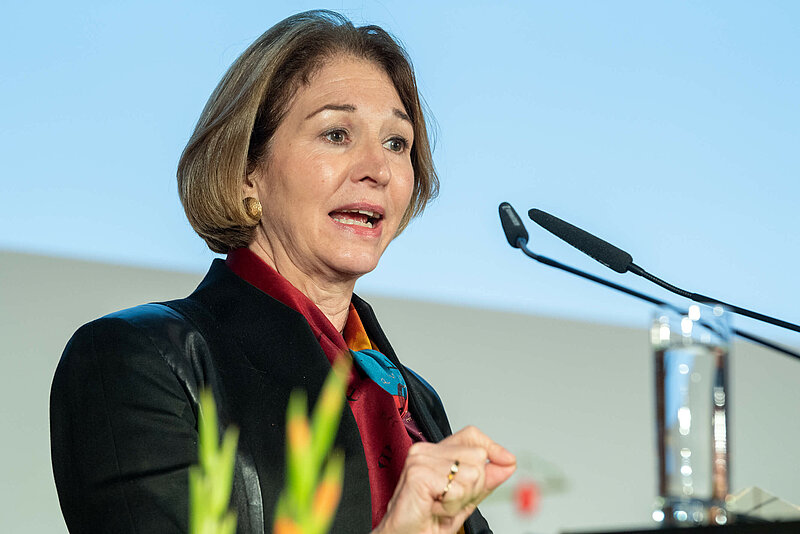
Anne-Marie Slaughter explains why public problem-solving demands an interaction between ideas and experimentation.
When the former Director of Policy Planning in the Obama State Department visited the Hertie School on 8 October to receive the school’s Dr. Michael Endres Prize, she showed us a bit of #hertielove. She held a lecture on “The new practice of public problem-solving” and participated in a panel discussion. And she sat down for an interview with the school’s communications team. If you missed her this time, Slaughter will be back several times during the course of the academic year as part of the award. Read some insights she shared with us during her day at the Hertie School, and listen to a podcast of her speech here.
Hertie School: What do you see as the biggest challenge for Hertie School students – for students of public policy today - in solving public problems?
Anne-Marie Slaughter: I think the biggest challenge is how to mobilise the full spectrum of economic, political and social resources to meet complex public problems. We still face issues like great power rivalry or denuclearisation, nuclear proliferation, or armed conflict, which remain in the purview primarily of governments. But for most of the big global challenges, like climate change, resource depletion, pandemics, cyber security or migration, we need the combined efforts of the social, private and public sectors. And those of us who are public problem-solvers have to think about how to build coalitions or networks and align interests and goals to create the scale of activity we need to meet the problems.
Hertie School: Is aligning those goals pretty hard?
Anne-Marie Slaughter: Yes - just take climate change and break it out to something like ocean acidification. Everyone can agree that we should make the oceans less acid, but you’ve got corporations with one view and governments with another view – and some governments with conflicting views. For example, cities often come at a problem differently than national governments. You could say that’s just politics, that’s just what governments do. But I no longer think that’s enough. We basically need the equivalent of a problem-solving process of which governments are a big part - but they are not the whole thing. Governments can become paralyzed – and even when they do function, you have civic and corporate actors that wield as much power as many governments. And that’s not just big corporations. Greenpeace or Environmental Defense or Oxfam – these are big organisations that can mobilise coalitions of many smaller organisations.
Hertie School: Of those three actors – government, civil society, the private sector – do you see one taking a leadership role in such efforts?
Anne-Marie Slaughter: I think it depends on the issue, on the moment. I don’t think it is necessary for any one particular actor of those three to take the lead. If I think about GAVI, the vaccine alliance – that was started by the Gates Foundation - it involves governments and international organisations and NGOs and pharmaceutical companies. In other cases, initiatives could be at the city-level. When Michael Bloomberg was mayor of New York, he mobilised other mayors. National governments obviously still play a role, but it’s often small states that really can push initiatives and who typically ally with other kinds of actors. Large corporations can also take initiative – for example, in the US, Starbucks and the Arizona State University created a partnership whereby baristas can get a degree at Arizona State. Here you had a non-profit and a major corporation taking an action that may well become a model for others and may lead to changes in how we recognise degrees.
Hertie School: What is your vision for the role of government in what you call the “new practice of public problem-solving”?
Anne-Marie Slaughter: We are at a historical inflection point – and when I say point I mean a couple of decades, I don’t just mean 2018. People will look back and it may be hard to say when this great revolution started and ended but it’s comparable to the late 19th century, when we had the beginnings of the progressive movement in the United States, the rise of the welfare state in Europe. I think government has a role more as an investor in human capability than as a service provider, and as an enabler of many different experiments and testing and innovation in problem-solving. I think we still have a need for the kind of massive frameworks that really only government can provide – it has scale that no corporation or civic organisation can reach. But the way government creates policies and laws will change – and even the process of regulation will have to be a rolling process, some kind of continuous adaptation because of the way society and technology are changing so rapidly. I think that the outlines of where we are heading are very blurry, but it’s possible to see that there is a new paradigm just over the horizon. Many of us are finding our way towards it right now.
Hertie School: What would you say are the threats related to this change at a global level?
Anne-Marie Slaughter: This new, as yet very blurry, paradigm is going to compete with state capitalism, with authoritarian capitalism. We can see the outlines of that very clearly: China and the many countries that are following China’s model. Russia not so much – Russia is a traditional, corrupt, authoritarian state. But China really does have a new model. We’ll see how stable it is. But we’ll also see how stable the United States is. There are traditional geopolitical rivalries, but there are also new ideological rivalries. They are not as neat as capitalism vs. communism, although maybe those weren’t so neat either. But I think the model of liberal democracy based on individual rights and individual initiative – capitalism – is under deep strain and is breaking and evolving.
Hertie School: And what could that evolve into?
Anne-Marie Slaughter: Well, it’s not clear, but there are experiments taking place – experiments with universal basic income, for example. The social entrepreneur Hilary Cottam has written a book called Radical Help, which is a very different vision of the role of government. Her premise is that what people need more than anything is connections – to be connected to others who can help them help themselves. And that’s a much more lightweight understanding of the role of government than providing services. I think it’s right in many ways because we now have so many tools that people can have much more agency over their lives in terms of pursuing what they want to do. Some of what they need is money, but they also need to be able to find the right connections, to be able to map out a course and pursue it.
Hertie School: How can we build bridges between ideas and solutions that often appear radically different or even incompatible?
Anne-Marie Slaughter: I don’t think you can find solutions at the national level in the US, because people are so dug in. So you turn to local politics and work on real problems in real time in a way that may not affect more than your community – but that does directly affect your community. Through doing that, you find new bases for trust and new approaches that are beyond right and left. The idea that only markets or only governments will solve our problems is like drawing on medieval theology to address the problems of the Renaissance or later. It just seems deeply anachronistic and it doesn’t speak to young people at all. So we don’t know what will replace our current models, and I don’t think we can figure it out in the realm of ideas – I think it has to come from real experimentation. It has to come from an interaction between ideas and experimentation. That’s what I’m laying out in the new practice of public problem solving. It’s an approach to problem solving that is much more interactive between government and citizens and top and bottom. Government is learning how to experiment and civil society – social entrepreneurs – who are private sector actors with civic missions, and indeed some corporations who are civically minded, are looking for solutions through testing and experimentation.
About Anne-Marie Slaughter
-
Anne-Marie Slaughter is currently the President and CEO of New America, a think tank and civic enterprise with offices in Washington and New York. She is also the Bert G. Kerstetter ‘66 University Professor Emerita of Politics and International Affairs at Princeton University. From 2009–2011 she served as director of Policy Planning for the United States Department of State, the first woman to hold that position. Prior to her government service, Slaughter was the Dean of Princeton’s Woodrow Wilson School of Public and International Affairs from 2002–2009 and the J. Sinclair Armstrong Professor of International, Foreign, and Comparative Law at Harvard Law School from 1994-2002.

